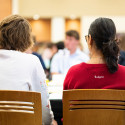Newsmakers

(Every week faculty and staff from across campus are featured or cited in newspapers, magazines, broadcasts and other media from around the country. The listings that follow represent a small selection of the many stories that spotlight UW–Madison and its people. More newsmaker listings)
Go to school – now
The trend of holding a child back from entering school to try to realize a physical or emotional advantage over classmates hasn’t won the favor of researchers. Elizabeth Graue, a professor of education, and colleagues surveyed the performance of third graders who had been held back from entering kindergarten for one year. She found no academic outperformance and also discovered that children held back were more likely to need special care in school. “If we’re delaying entry into kindergarten, we’re delaying early intervention,” Graue tells Education Week (April 12).
Home alone: Fine for some
New studies are suggesting that leaving kids home alone – provided that the duration and their age is right – may not be a bad thing. A survey detailing the habits of children between the ages of 5 and 12 who spend some time home unsupervised found that they generally like the autonomy and freedom from set plans. Deborah Lowe Vandell, a professor of educational psychology who has studied child care and after-school programs, tells the New York Times (April 11): “I think it would be foolish to say that all self-care is bad, that children shouldn’t have any time alone, especially as they get older.” But she says too much unsupervised time could have effects worse than the possible harm of overprogramming a child.
Weaving an accessible Web
More universities are taking education into cyberspace, but it is unclear how many of the nearly 1 million disabled students are making a smooth transition to online learning. Gregg Vanderheiden, director of UW–Madison’s Trace Research and Development Center, tells the New York Times (April 9) that some of the materials being prepared for online learning do not take into account access for disabled students. He has worked to set up guidelines for teachers and others who create online materials that ensure they are usable by people with disabilities. He says many web authors simply don’t understand the limitations of disabled users.
Wort: Popularity justified
Herbal supplements such as St. John’s wort and ginkgo have fueled a $14 billion industry and emerged as a real alternative for many patients to pharmaceutical drugs. But at the height of their popularity, there is also new concern about the safety of dietary supplements, which are usually much less thoroughly tested than drugs are before reaching the market. Because herbs cannot be patented, natural remedies typically require much less testing, leading some to call for greater regulation. But there exists a body of research on effects and safety of some herbs. “St. John’s wort has clearly shown benefits and is right up there with pharmaceutical antidepressants,” Bruce Barrett, a professor of family medicine, tells the San Francisco Chronicle (April 3).
Not just a white thing
White students are suing universities, claiming that they were unfairly discriminated against based on their being white. In many such cases, students claim that minority students with lower scores have been admitted in their place. But officials say that logic fails to understand the complexity of the admissions process, which weighs other factors including personal character, outstanding creative talents or their own professional judgment. “The complaint is most often from a white complaining about their spot being taken by a lower-scoring minority student,” Provost John Wiley tells the Washington Post (April 2). “For every lower-scoring minority student, I can find 10 lower-scoring whites who were admitted.”




